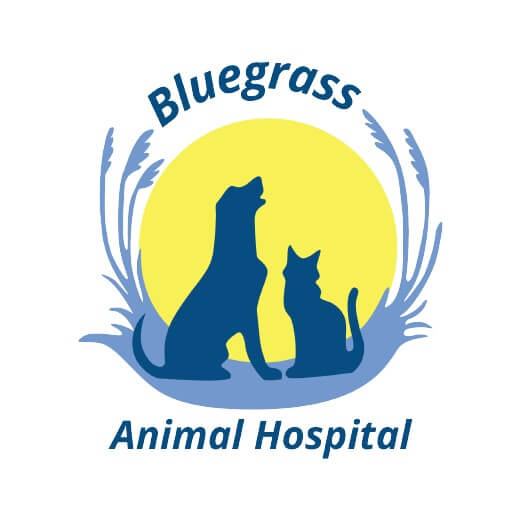It is not uncommon for pets to vomit or diarrhea occasionally. If your cat or dog ate something bad, vomiting and diarrhea are normal. Cats tend to vomit when they clean themselves too much and choke on a hairball. However, if your pet is sick for over 24 hours, it needs veterinary care. At Bluegrass Animal Hospital in Knoxville, TN, our veterinarian will determine if your pet is sick and provide the proper treatment.
Why Is My Dog Vomiting?
If your dog vomits once or twice in 24 hours, it’s nothing to worry about. However, chronic vomiting, vomiting blood, or vomiting while experiencing other health-related issues is something to worry about. Bluegrass Animal Hospital in Knoxville looks at common causes of vomiting in dogs and puppies.

Causes of Pet Vomit and Diarrhea
Your pet can be vomiting and not have diarrhea, and vice versa. There are several reasons why your pet might have these symptoms. These include:
- Reaction to food: If your pet ate something that didn't agree with it, it can get an upset stomach, causing vomiting or diarrhea.
- Stress and anxiety: Your pet's stomach can get upset when it is stressed out or has anxiety, causing it to have diarrhea or vomit.
- Toxic substances/Poisoning: Vomiting usually appears with other symptoms like diarrhea, shaking, seizures, drooling more than usual, breathing problems, mouth swelling, pale gums, and irregular heartbeat. It is not uncommon for there to be blood in the vomit or the stool. Vomiting is one of the most common poisoning symptoms, even food poisoning. Toxic ingestion is a medical emergency. Call our animal hospital right away if you notice any of these symptoms for emergency care.
- Viruses: An intestinal virus can result in vomiting and diarrhea.
- Parasites: Parasites, such as roundworms and tapeworms, can cause gastrointestinal symptoms.
- Organ failure: The first symptoms of kidney and liver failure are vomiting and diarrhea.
- Intestine issues: If your pet has an intestinal obstruction or twisted bowel, vomiting and diarrhea are common.
- Bilious Vomiting Syndrome: This is a common problem in older dogs caused by excess stomach acid. It’s not contagious. Your dog will vomit several times but only vomit white or yellow bile every time. Dogs need to eat to put something in their stomachs to help ease nausea and stop vomiting. If your dog has refused to eat for a whole day, call our vet team for a professional assessment.
- Overeating: Puppies will eat too fast and try to fit far too much food into their tiny bellies. This causes them to vomit. Dogs never quite outgrow this tendency to overeat. When a dog vomits from overeating, he or she tends to only vomit the food. Once the stomach has emptied, the vomiting stops. However, call our animal hospital if your dog does not stop vomiting or cannot keep any food down after a day. This is a sign of something more serious occurring.
- Canine Parvovirus: There are many illnesses that cause a dog to vomit, but one of the most common is canine parvovirus or parvo. This is especially deadly for puppies or dogs already sick with something else. Parvo causes vomiting, vomiting blood, diarrhea, diarrhea with blood, loss of appetite, loss of energy, and abdominal bloating in dogs. There is no cure for parvo. That’s why it’s important to have your dog vaccinated for parvo.
- Allergies: Allergies are common in dogs. Allergic reactions can cause vomiting but usually cause other symptoms along with vomiting, like diarrhea, itchy skin, hives, chronic ear infections, runny eyes or nose, sneezing more than usual, coughing, and noisy breathing.
What to Do if Your Pet Is Vomiting or Has Diarrhea
If your pet is vomiting or has diarrhea, it is best to keep it away from food and water to give the stomach a chance to settle. When the symptoms have ceased, you can start giving your pet small amounts of food and water. It is best to start with bland foods, such as chicken and rice and a limited amount of water. If your pet is able to hold this food down, you can start giving it small amounts of regular food.
If your pet cannot hold bland food and water down, you should schedule an appointment with our veterinarian.
Why Are Vomiting and Diarrhea Dangerous?
If your pet is vomiting or has diarrhea for over 24 hours, it can become dehydrated and will need IV fluids to stay hydrated. If the problem persists, our vet will need to examine your pet to determine the cause of its gastrointestinal issues. If the issue is due to toxic substances, a virus, a parasite, organ failure, or intestinal issues, our vet will provide the proper treatment for the condition.
Schedule an Appointment with Our Veterinarian in Knoxville, TN Today
If your pet is vomiting or has diarrhea for over 24 hours, contact our vet. These symptoms could indicate a serious health issue in your pet. At Bluegrass Animal Hospital in Knoxville, TN, our veterinarian will examine your pet and provide treatment. Call us today to schedule an appointment.
